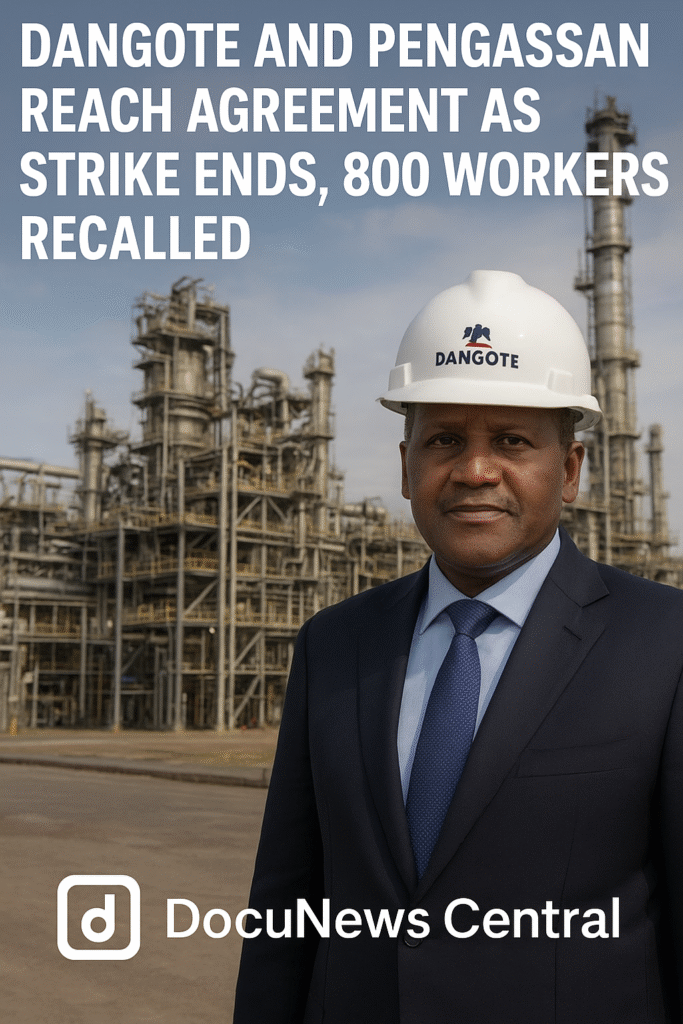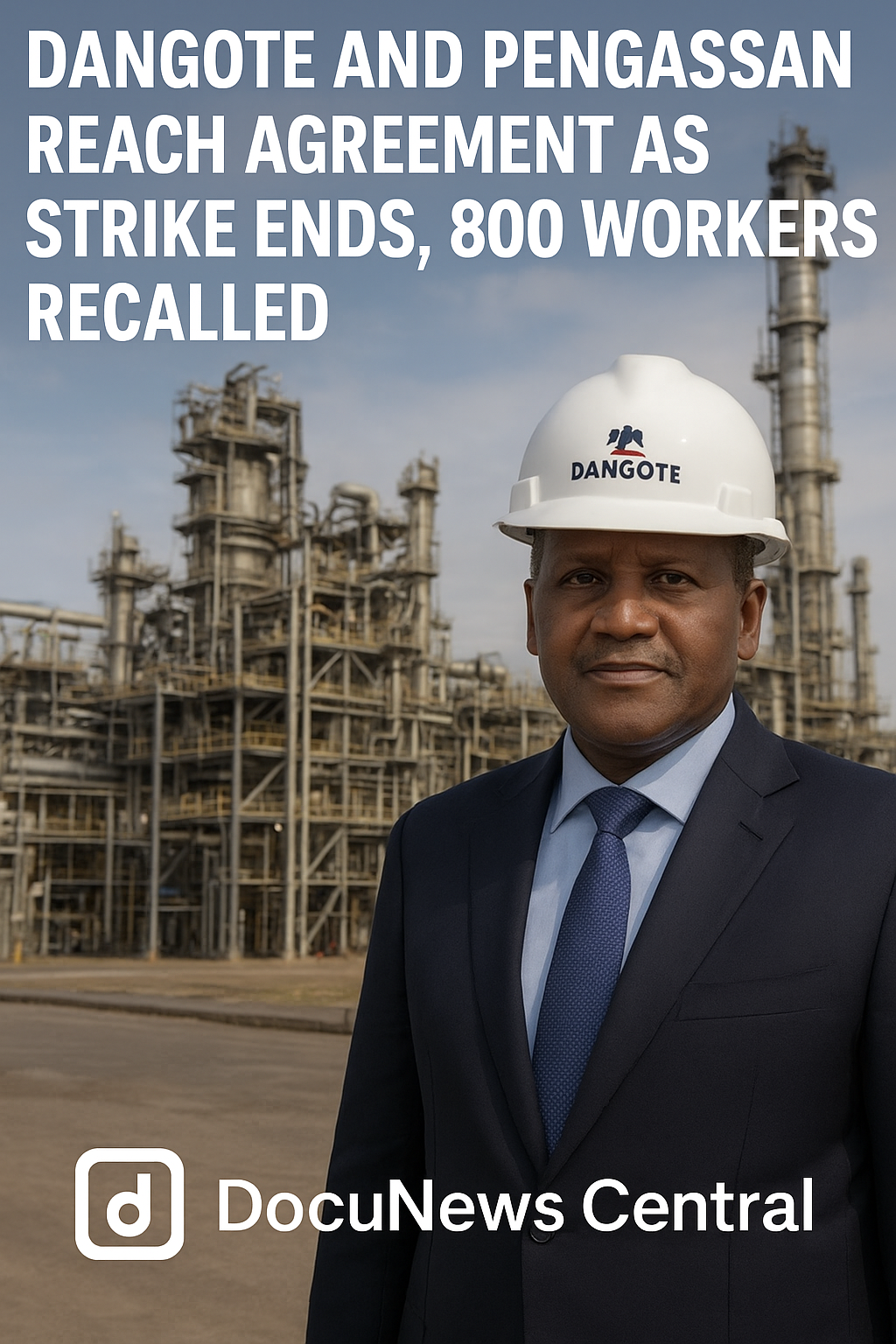
Dangote and PENGASSAN Reach Agreement as Strike Ends, 800 Workers Recal
Fresh Deal Ends Heated Dispute
A breakthrough has finally been achieved between Dangote Refinery and the Petroleum and Natural Gas Senior Staff Association of Nigeria (PENGASSAN) after days of tension that shook the oil and gas sector. Following several hours of intense conciliation talks in Abuja, both parties signed a new agreement which has brought the nationwide strike to an end.
As part of the deal, the refinery will recall the 800 dismissed workers who were at the centre of the dispute. The management also agreed that no worker will suffer any loss of salary or benefits. For its part, PENGASSAN has suspended its strike action, allowing crude oil and gas supply to resume to the multi-billion-dollar refinery. read also IPOB SLAMS TINUBU’S INDEPENDENT DAY SPEECH, docunewscentral.com
How the Dispute Began
The conflict began when the management of Dangote Refinery terminated the contracts of over 800 employees in what it described as part of a “restructuring exercise.” The company insisted that the decision was necessary for operational efficiency. However, PENGASSAN strongly opposed the move, accusing the refinery of victimising employees for attempting to join the union.
The mass dismissal triggered outrage within the union, which responded by ordering members to halt crude oil and gas supply to the refinery. The strike action spread rapidly, raising fears of fuel scarcity and further disruptions in Nigeria’s already fragile energy market.
Union’s Stand and Strike Impact
PENGASSAN leaders argued that the dismissals were not only unfair but also an attempt to weaken workers’ rights and prevent unionisation. The strike gained momentum, and as the shutdown dragged on, Nigerians began to worry about the possibility of fuel shortages, which could have had serious economic consequences.
The pressure mounted on the government to intervene, as the refinery plays a key role in Nigeria’s fuel supply system. With 800 workers suddenly out of jobs and the union standing its ground, the dispute quickly became a national issue.
Government Steps In
The Federal Ministry of Labour and Employment stepped into the crisis in a bid to protect jobs and prevent the refinery from grinding to a halt. The ministry convened several conciliation meetings between Dangote management and PENGASSAN officials.
While the first rounds of talks ended without progress, the latest meeting in Abuja produced a more positive outcome. After several hours of negotiations and consultations, both sides finally reached a compromise.
Highlights of the Agreement
The communique signed after the meeting outlined the following key points:
Recall of the 800 sacked workers.
Workers will be redeployed to other subsidiaries within the Dangote Group.
Employees will retain their salaries, benefits, and entitlements.
No worker will be punished for participating in the strike.
Workers are free to join PENGASSAN without fear of victimisation.
This agreement has been described as a major relief for the affected workers and their families, as well as for the entire oil and gas industry.
Suspension of the Strike
With the new deal in place, PENGASSAN announced the immediate suspension of its strike. The union directed its members to resume full operations, ensuring the supply of crude oil and gas to the refinery continues without disruption.
The strike, which had raised the spectre of another round of fuel scarcity, has now been averted. For Nigerians already grappling with economic challenges, this truce comes as welcome news.
Court Order Still Active
It is important to note that the National Industrial Court in Abuja had earlier issued a seven-day restraining order against PENGASSAN, barring the union from blocking crude supply to the refinery. That order remains in force, meaning the union is still under legal obligation to avoid further disruption.
Observers say the truce has reduced the tension, but the existence of the court order shows how fragile the situation still is.
Dangote Group Reacts
The Dangote Group has welcomed the agreement and confirmed that redeployment of the affected workers will commence without delay. The company maintained that the sack of the 800 workers was a restructuring exercise and not an attempt to victimise staff.
Management further assured that no worker would lose any benefits and that employees are free to exercise their right to join unions as provided by law.
Union Leaders’ Position
On their part, PENGASSAN leaders hailed the deal as a victory for labour and a reflection of the power of unity. According to the union, the recall of 800 workers is proof that dialogue and collective bargaining remain effective tools for defending workers’ rights.
They urged Dangote management to continue engaging with staff in a transparent manner to avoid similar conflicts in the future.
Government’s Reaction
The Federal Ministry of Labour described the agreement as a win-win solution that protects jobs, respects workers’ rights, and ensures stability in Nigeria’s energy sector. Officials also promised to monitor the full implementation of the deal to ensure that both sides live up to their commitments.
Why This Agreement Matters
The Dangote Refinery is Africa’s largest privately-owned refinery and a central part of Nigeria’s energy strategy. Any prolonged disruption in its operations would have triggered fuel shortages and worsened the country’s economic woes.
This peace deal has therefore prevented a national crisis, saved hundreds of jobs, and stabilised the country’s fuel supply chain. For many Nigerians, it also restores confidence in the importance of dialogue between labour unions and employers.
Public Reactions
Across social media platforms, many Nigerians have expressed relief over the truce. Some praised PENGASSAN for standing firm in defence of workers, while others urged the Dangote Group to keep its promises and avoid further disputes.
For the 800 workers and their families, the recall means economic stability and renewed hope. For the wider public, it is a reassurance that fuel scarcity will not return — at least for now.
Looking Ahead
Despite the positive outcome, analysts caution that the situation remains delicate. The success of this agreement will depend on how quickly and effectively the workers are redeployed and whether Dangote management truly upholds the right of employees to unionise.
If both sides remain committed to the terms of the deal, Nigeria’s oil and gas sector may enjoy a period of peace. If not, the dispute could resurface in the future.
Conclusion
The resolution of the conflict between Dangote Refinery and PENGASSAN marks a significant moment for Nigerian labour relations. The recall of 800 workers, the suspension of the strike, and the recognition of union rights all point to a more balanced path forward.
For now, Nigerians can breathe easier knowing that jobs have been saved, fuel supply is secure, and peace has returned to one of the country’s most vital industries.
Related Posts
[NLC Strike: How the Shutdown Shook Nigeria’s Economy]
[Why Fuel Supply Matters: Inside the Dangote Refinery Project]
[Union Rights in Nigeria: What Every Worker Should Know]
[Court Orders in Labour Disputes: What the Law Says]












One thought on “Dangote and PENGASSAN reach Agreement: strike Ends”